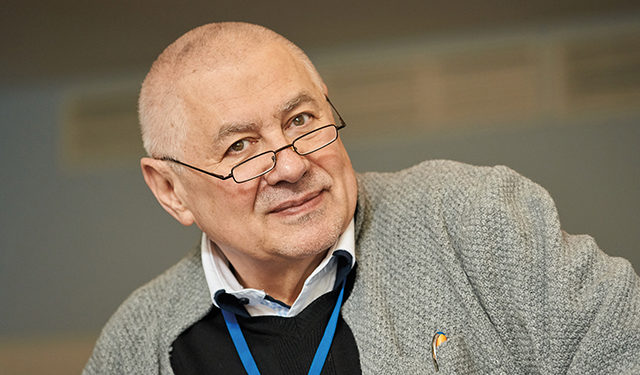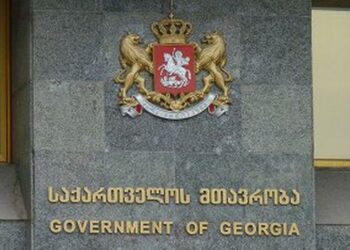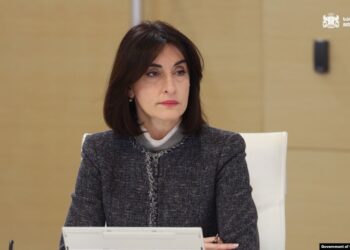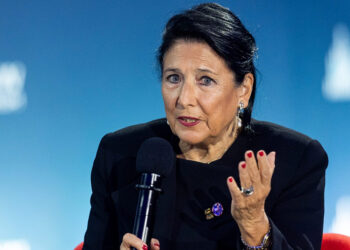The war will at first be indistinguishable from regular special operations. It will be [sparked] by a decision to protect something nobody cares about – whether it’s trampled values, or the Donbas,” – Gleb Pavlovsky, Putin’s former adviser and a Kremlin spin doctor gone rogue, wrote in 2021. In 2021, the war didn’t happen, but the scenario remained the same for what was to unfold in 2022, he claims in an interview with Radio Free Europe’s Georgian service.
You worked for and with Putin for years. How has he changed over the years? What was he like back then, compared to present?
I think I caught his best years – his first two terms of presidency. This was an active, liberal-conservatively minded politician, with a penchant and guile for communication. He was adored back then, not only in Russia, but also in Ukraine. Back then in Ukraine there was a search for “their own, Ukrainian Putin”, however, this search was unsuccessful, both in case of Yushchenko and Yanukovich.
Today, Putin is a completely different man. Even his manner of speech is not recognizable anymore.
Any regrets? About working with and for Putin?
I don’t regret the time spent as such. What I regret is that I switched off my brain as an analyst during that time and, in a way, donated my brain to “Kremlin and Putin franchising.” Now I realize that I should have had a wider perspective of things, that I should have recognized the features of the system that we were building. Putin is a child of this system. Putin will be gone, one way or another, but the system will stay.
Putin will be gone, one way or another, but the system will stay
So you and your colleagues created a Frankenstein monster at a state level. Do you feel guilty about it?
I don’t think that would be an interesting topic to explore. At my age, you have so many reasons to feel guilty that if you don’t feel it, then you’re simply an idiot. The thing is that at some stage, we started building a system that was fundamentally wrong. Even if we had built an authoritarian system, like in Singapore or Malaysia, it would have been more right than what we did. Because what we built is building on the clouds, instead of firm foundations, which lets the state escape any rules and norms, to avoid any “traps.” It’s the first time now that this system, thanks to Putin, ended up in a trap that it is finding difficult to escape from. It’s an unfinished state and this allowed for incredible flexibility that, for example, the Soviet Union didn’t possess. While the Soviets had ideology, we have just propaganda, which brainwashes people to an extent that they are turned into thralls. Our country doesn’t have an ideology.
Many parallels are drawn between 2008 and now. Are they justified? You were still advising the Kremlin at the time. What was the mindset back then?
It’s not a precedent that should explain what is happening today. The situation was different back then. Back then, we expected war, and the start of this war was expected to come from the then Georgian President Saakashvili. We first thought, in the spring, that it would happen in Abkhazia, but there was a readiness from our side to catch him in a trap, as soon as he started it. Unfortunately, he fell for that trap in [South] Ossetia. The situation was different, because it implied the inevitability of the Russian response, because everyone in Russian society was demanding it, including the liberal public. In contrast to the mythical [Ukrainian] attack on Donbas, which didn’t happen, there [in Georgia] such an attack did take place. This kind of attack gives you a casus belli. It is also important to keep in mind that it happened at the absolute height of Putinism and Putin’s system, because 2008, before the crisis, was actually his best year – Putin left the Kremlin, as he was supposed to, and in came a new president, whose approval rating was even higher than Putin’s. Those were the good times!
Russia doesn’t have a political stage anymore – instead we deal in biblical themes: Death, war, tyranny
Why prepare a trap for Georgia and Saakashvili in the first place? What danger did he pose to Russia?
Because Saakashvili, to put it bluntly, wasn’t exactly a diplomacy genius. He was a strange man – he first wanted to make a deal with Putin. He wanted to get these territories from Putin, but he didn’t have anything worthwhile to offer for such a deal, or he didn’t know how to do it. Fast-forward to 2008 and the Russia-Georgia relationship was just awful, there were trade wars, energy wars. He wasn’t much helped by President Bush, whose help amounted to a pat on the shoulder regarding the color revolution and saying: this is how things should be done. This obviously didn’t sit well with Putin at all.
And now, you claim it’s Putin who stepped into a trap – but who put it there for him?
Hard to say, but when a man has it written on his forehead that he wants to be deceived, others will usually oblige. One thing I keep pondering is that the US is very keen on waging information warfare against Russia, but isn’t trying to stop the real, conventional one. My hypothesis would be that it’s an acceptable sacrifice. Just like the one in Afghanistan that Brzezinsky later owned up to, after 20 years. The goal was to use another country as a bait. Just like in the 80s, Afghanistan wasn’t of much value to Americans, and they tried to prolong that war instead of ending it, I think today Ukraine might be a similarly acceptable sacrificial lamb. This is just a hypothesis, but it’s a fact that Russia got caught on rather childish bait. But this does little to make things better for Ukraine, as Putin won’t stop what he started – he will continue turning the country into ruin. If he does have any red lines left, he does a very good job covering them from us.
You argued on Fox News that he was delusional and no longer connected with reality – could you elaborate on the aspects of that delusion? Where does it stem from and what should be expected?
We can say that we’ve arrived at some sort of final stage where Putin has started acting irrationally, but I don’t think the reason for that is some sort of mental disorder, or as some have put it, that he has gone crazy. This would be an all too easy, primitive explanation – oh, he’s gone cuckoo, that’s why he’s doing these things. I think we can say that he stepped into a trap with Ukraine, that the decision makes no political sense, it’s insane. This is all Putin’s personal decision. Nobody other than Putin would have made it, not even Ramzan Kadyrov, had he had a say on it. Nobody, including myself, realized just how maniacally obsessed Putin must have been with Ukraine. We underestimated the extent of degradation of the Russian government. We don’t have a political stage anymore – instead we deal in biblical themes: Death, war, tyranny. Ukraine was meant to be a lever for pressuring the West into discussion over security issues. It’s a game of strategy. But I was flabbergasted to see him throw away all negotiation opportunities over the genuine security of Russia and instead opt for this strange pogrom that he calls a “special military operation”.
While the Soviets had ideology, we have just propaganda, which brainwashes people to an extent that they are turned into thralls
What can he do now, with the war not going according to plan? How far will he go?
Wars don’t always go according to the initial designs, but now we have a situation where no-one can work out what actually would constitute victory or defeat for each side. Signing a ceasefire immediately would be the smartest thing Russia could do right now. It could get a neutrality status out of Ukraine, but that would amount to next to nothing. As for “demilitarization”, which has been turned into a propaganda slogan, the extent of damage to Ukraine’s military infrastructure is large enough to claim that “demilitarization” has been achieved. Russia will try to keep the territories it has seized so far, especially the ones bordering the Sea of Azov, but this will depend on the willingness of Ukrainians to negotiate and stop the fighting. At this moment, they have this adrenaline rush of resistance, and this also doesn’t help rational thinking. Many of them want to continue fighting because they think they can win the war. But I don’t understand how a Ukrainian victory would look, what it would entail in conventional terms. The same goes for the Russians: Their initial plan failed and even a successful capture of Kyiv would put an insurmountable strain on the Russian military. This would mean colossal ruin and casualties, and it would take the war to a new level, making the prospects of any ceasefire even dimmer than before. I live in Russia, and more than most, I am concerned about Russia’s interests – Russia’s interests dictate that this idiotic war should be wrapped up as soon as possible and, instead, focus should be shifted to the sanctions, which pose a far greater danger for Russia [than the war]. If a ceasefire is reached before May 9, so Russia can celebrate and “sell” this as a victory, then that’s a good outcome, if not – we won’t have peace, the negotiations will drag on, and Russia will encounter even greater problems with sanctions. And if Russia doesn’t get peace, if it opts to continue the war, then it might do things in Ukraine that will see this conflict escalate to an unforeseen level. And this next level will take place beyond Ukraine’s borders. This might spill into a conventional warfare between Russia and the West, with NATO. How exactly this would look is hard to say, but I no longer think this to be unthinkable and impossible.
Russia’s interests dictate that this idiotic war should be wrapped up as soon as possible and instead focus should be shifted to the sanctions, which pose a far greater danger for Russia [than the war]
Can the West offer him some kind of off-ramp that he can sell to a domestic audience? Is he even worried about selling the story to people back home?
He is concerned, otherwise he’d not bother with such a show, one like we recently saw on Luzhniky. It is important for him, but this doesn’t mean that he is in any way dependent on it. In his own mind, he has soared high above all and everyone, and looks down on everyone he talks to. I can imagine how he is mocking Macron who talks to him almost every day. He has this belief in his own good fortune, and probably thinks he’ll have yet another divine streak of luck. He believes in his great mission – I am absolutely sure he thinks himself as greater than all the heroes of Russian history taken together. So he can afford not to heed anyone and to go further to accomplish his mission. I don’t think he has a rational grasp of this situation.
The impact of the sanctions, painful as they are: Many think it will just reinforce Russia’s fortress mentality.
This is a correct assumption. I don’t think the population realizes the impact of the sanctions yet, but they will start feeling it come summer. And as soon as they realize that the sanctions are designed to destroy both the Russian economy and the Russian federation, everyone will unite to resist. Will they blame Putin or themselves for it? Was any Russian, seeing German tanks rolling in in 1941, blaming Stalin and Molotov? It was too late for that, the tanks were already here and about to mow him down. The question of guilt is a very important one, but nobody in Russia is going to commit suicide for it. Sanctions have become a means to destroy Russia, so they will be resisted by everyone. Maybe a couple of hundred people will come out in defense of the West, but that won’t mean anything.
Do you see the West lifting the sanctions if a ceasefire is reached?
No, not at all. What a ceasefire will do is stop new, additional sanctions that are bound to come if the war continues. If Moscow sets lifting the sanctions as a pre-condition for the ceasefire, this won’t happen, because it’s not up to Kyiv.
One of the underlying expectations of sanctioning the oligarchs, the Kremlin elite, is that it is going to have an impact, and ideally, turn them against Putin. Could this happen?
Out of the question. That “theory” assumes that the oligarchs rule Russia. Oligarchs have never ruled Russia, even during the times of weak Yeltsin. They always lost against the ruling power. We are talking about a shortlist, where people are monitored and under control 24/7.
Putin’s advisor Chubais quit because of the war in Ukraine, and left Russia. Will others follow?
There is a false and even weird assumption that Putin’s inner circle will start distancing itself from him. This won’t happen. And Chubais himself was not a member of this inner circle anyway. He won’t be missed, because he is no longer relevant, hasn’t been for years – he is a political relict of long bygone era. Had he been of any value to the Kremlin, he would not have been allowed to “escape”.
Who in Putin’s circle might be eyeing the throne?
His entire inner circle. They aren’t idealists, they have their own designs on that throne. They are all waiting for the transition. And it’s actually making Putin quite nervous, being surrounded by people who crave his throne. Especially considering that the majority of the day-to-day running of the country is done by them and not by him. If anyone thinks Putin is sitting and running the country’s economy, or public life, then that’s just laughable. Putin actually isn’t much of a hardworking type. And he found himself the only dimension where he can be completely independent from anyone – war. And he is rushing headlong towards it and is dragging others along with him.
Does the West have any reasons to be optimistic about Putin’s successor?
It is a foolish idea to think that a new Gorbachov will emerge and everything will change magically. Whenever Putin leaves, he will be succeeded by some form of collective management, because each of them will be afraid and reluctant to give way to the other. I’m expecting a period of collective management, but who will be the members of such a coalition I cannot predict, quite likely at least some members of Putin’s current inner circle will be present there.
Will Putin ever be accepted back by the West, once all this is over? We hear he wants to attend the G20 summit in Indonesia.
It’s impossible to return to February 23. Not only for Putin, but for Russia too. On the other hand, the G20 can’t boycott him, because certain members have the power to veto such a decision. But if he really tries to attend, it will produce a scandal and some of the Western governments might decide not to attend themselves. I think Moscow realized this – so it will be either Putin who finds an excuse not to go, or he will dive deep into yet another scandal. But this visit, even if it happens, doesn’t mean Putin will have been allowed to “return”.
Will he have to answer for things he has done? Who can make it happen?
I think he will – even Stalin had to answer for what he had done, albeit posthumously. Will he have to answer during his lifetime? Hard to say. It’s possible only in a scenario where a radical change of power happens in Russia, which I don’t see happening at this moment. I don’t see the support for it.
Could Navalny be the man to bring about such a change?
If such a radical change happens, Navalny will be released the next day, that is obvious. But will he be in power? I don’t think so. I think there will be a wide coalition that will try its best to ensure Navalny doesn’t come to power in the Kremlin. They will be afraid of him. Navalny is growing in stature, he matters more, and he doesn’t need to do anything other than sit in prison. But you also need to keep in mind that for many in our [liberal] establishment it’s very comfortable that Navalny is sitting in prison.
Can he grow into a fully-fledged alternative to Putin?
Yes, he can, and I think he does have what it takes. In my eyes, he already exceeded my expectations of what would have been his maximum on several occasions. He’s a long-run player and I hope he’ll manage to accomplish this.
Interview by Vazha Tavberidze














